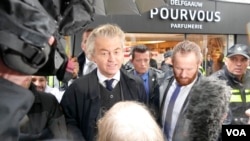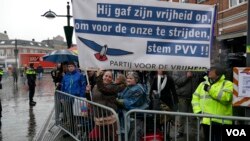After topping the polls for months, anti-immigrant, anti-Islam, far-right Dutch politician Geert Wilders, often dubbed the Dutch Donald Trump, is now polling in second place, less than a week before the Dutch national elections.
A square in the center of Breda, a mid-sized city in a southern province, is filled with police while rain pours down. Retired truck driver Rien Adriaanse has come to see Wilders, leader of the Freedom Party. Adriaanse has decided that this year, for the first time, he will vote for the Freedom Party of Wilders.
“I always voted for the Social-Democrats, but I am tired of them now. But I see this as a strategic vote because I don’t agree with everything that Wilders says. I just don’t want [current Prime Minister] Mark Rutte to win again. If Rutte wins, it will mean another four years of being deceived.”
Many citizens supporting Wilders say all other politicians make promises that they keep breaking, and they feel the political establishment needs to be shaken up. Over the past four years, the Social Democrats and the conservative Liberals formed the Dutch government.
Anti-establishment insider
Susan Pfaff-Bons drove down from another city with her own banner to show Wilders her support. “I feel that Wilders is the only one who defends the people, the other politicians are just there for their own benefit,” she said.
Wilders appeals to voters for being anti-establishment, despite being one of the longest serving members of parliament. Political lecturer at the Radboud University Koen Vossen has followed the rise of populism and Wilders’ party specifically. Vossen describes Wilders as a workaholic and a skilled media strategist.
“He profiles himself as an outsider, but he knows all the procedures in parliament. However, in all other ways he doesn’t participate like other politicians. He canceled all his debates and he probably does that intentionally,” said Vossen.
Wilders does not make many public appearances, partly because he has been living under 24-hour security since 2004 due to his anti-Islamic statements. Last week, Wilders temporarily canceled all his campaign activities when it became clear his security detail had leaked information to a criminal gang.
A statement or a tweet from Wilders often is enough to dominate the Dutch news cycle. He has almost 800,000 followers on Twitter. He has said women who wear headscarves should be taxed, and his cry for "less Moroccans" in the Netherlands led to him being convicted of hate speech last December.
Trump comparisons
When Wilders does appear in public, there is as much media waiting for him, as there are voters. While handing out flyers, he shortly responds to a few questions from international journalists about whether or not he is the Dutch Donald Trump.
“I am an original of myself. Maybe not as a result of elections, but movements like mine and in Germany and Austria and Italy, we’re getting stronger in the last few years," said Wilders. "Even before Trump came to office. Donald Trump, however, is the one who won the elections. We didn’t do that yet. There might be similarities, but also a lot of differences. The situation in Holland, the rest of the world is different.”
There are a few similarities, though, between the new U.S. president and Wilders, other than their preference of communicating through Twitter, says Vossen.
“They both emphasize putting their own country first and both want to close the borders. They both have a strong aversion against Islam, but that feeling is much stronger with Wilders. They both communicate with extreme statements, although with Wilders it is most likely more controlled and calculated.”
Populist and right-wing movements are gaining popularity on the European continent, and right wing leaders, such as Wilders and Marine le Pen from France, make appearances together. But Wilders differs greatly with many far-right groups in his pro-Israel views.
Other Dutch political parties have ruled out the option of forming a coalition with the Freedom Party. But if Wilders' party does win the elections on March 15, he will have to take the first initiative of finding a coalition partner, which is needed in the Netherlands to form a government.
After the 2010 elections, Wilders provided support for a minority Cabinet, but the coalition had to step down after Wilders rejected some measures that led to new elections.






